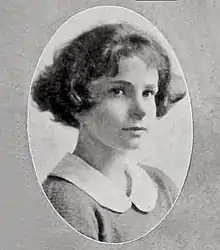Marie S. Klooz
Marie Stuart Klooz (December 29, 1901 – December 29, 2002) was an American settlement worker, lawyer, law librarian, and pacifist.
Marie S. Klooz | |
|---|---|
 Marie Klooz, from the 1922 Sweet Briar College yearbook | |
| Born | Marie Stuart Klooz December 29, 1901 Louisville, Kentucky, U.S. |
| Died | December 29, 2002 Sandy Spring, Maryland, U.S. |
| Occupation | Lawyer |
Early life and education
Klooz was born in Louisville, Kentucky and raised in Pittsburgh, Pennsylvania, the daughter of L. Fred Klooz and Sankie Hudson Klooz. Her father was a hotelkeeper.[1][2][3] She graduated from Peabody High School in 1919,[4] and completed a bachelor's degree at Sweet Briar College in Virginia in 1923. She earned a teaching certificate at the University of Pittsburgh, and a master's degree in International Law and International Relations at Columbia University. In 1960 she finished law school at George Washington University.[5]
Career
After college Klooz moved to Chicago, where she worked at the University of Chicago settlement house, teaching English. She was a sports writer for a Philadelphia newspaper in the 1920s, and a reporter for the Pittsburgh Post-Gazette.[6][7] In 1933, while working for Herbert Yardley, she assembled a report on "Japanese Diplomatic Secrets", considered so hazardous that the manuscript was seized by the United States government as a violation of the Espionage Act of 1917.[8][9]
In 1941, she was part of discussion on defense policy at the Academy of Political Science.[10] During World War II she worked in Washington, D.C. in various federal government departments. Klooz became a pacifist and a Quaker during World War II. She published an academic article on the United Nations in 1949.[11] She worked as a researcher for the American Friends Service Committee and the Women's International League for Peace and Freedom (WILPF) in the 1950s.[5] She represented the WILPF at a 1960 Senate hearing on the International Court of Justice.[12]
Klooz passed the bar in 1961, and was a law librarian for the American Society of International Law. In 1963, she filed an amicus brief in the case of Linus C. Pauling v. Robert S. McNamara, on behalf of several pacifist and anti-nuclear organizations.[13] From 1965 she was staff attorney for Neighborhood Legal Services. In 1965 she spoke at a memorial service for fellow Quaker Norman Morrison, who died in an act of protest by self-immolation near the Pentagon.[14] She was active in the ACLU, and in supporting conscientious objectors during the Vietnam War.[15] She had a private law practice in Rockville, Maryland until she retired in 1976.[5]
Personal life
Klooz lived in Sandy Spring, Maryland in her later years. She died in 2002, on her 101st birthday, at a Friends nursing home.[5] Her 1933 report on Japanese diplomatic secrets was retrieved from government files and published as a CD in 2001.[8][16]
References
- "L. Fred Klooz". Pittsburgh Post-Gazette. 1939-02-06. p. 9. Retrieved 2021-03-14 – via Newspapers.com.
- "L. Fred Klooz Dead; Hotel Man 50 Years; Former Manager of the Theresa Headed Trade Groups". The New York Times. 1939-02-05. ISSN 0362-4331. Retrieved 2021-03-14.
- "L. Fred Klooz Thinks So Much of His Hotel He Buys It". The Hotel World. 90: 16. June 26, 1920.
- "Large Classes Are Graduated from Three High Schools". The Pittsburgh Press. 1919-06-25. p. 14. Retrieved 2021-03-14 – via Newspapers.com.
- Farquhar, Elizabeth. "Memorial: Marie S. Klooz" The Bar Association of Montgomery County, Maryland.
- "Woman's Press Club Names New Members". Pittsburgh Press. November 6, 1929. p. 26. Retrieved March 14, 2021 – via Newspapers.com.
- Klooz, Marie (1928-02-11). "Double Music Bill Pleases". Pittsburgh Post-Gazette. p. 19. Retrieved 2021-03-14 – via Newspapers.com.
- Kahn, David; Gonnerman, David; Schmidt, Jürgen (2001-12-01). "Reviews". Journal of Intelligence History. 1 (2): 196–199. doi:10.1080/16161262.2001.10555057. ISSN 1616-1262. S2CID 220331623.
- Klooz, Marie Stuart (1933). Japanese Diplomatic Secrets, 1921-22: The Story of the Events Leading Up to and Including the Washington Conference on the Limitation of Armaments, and Pacific and Far East Questions as Revealed in the Private Diplomatic Correspondence of the Japanese Embassy in Washington. G.T. Bye & Company.
- Mitchell, Wesley C.; Hyslop, Beatrice; Woodward, Clark Howell; Aranow, Mrs.; Jewett, Frank B.; Candee, Robert C.; Klooz, Marie S.; Earle, Edward Mead; Beddow, Noel; Lin, Lin; Cameron, Nicholas (1941). "Discussion: The Bases of an American Defense Policy: Armed Forces". Proceedings of the Academy of Political Science. 19 (2): 49–57. doi:10.2307/1172588. ISSN 0065-0684. JSTOR 1172588.
- Klooz, Marie Stuart (April 1949). "The Rôle of the General Assembly of the United Nations in the Admission of Members". American Journal of International Law. 43 (2): 246–261. doi:10.2307/2193034. ISSN 0002-9300. JSTOR 2193034. S2CID 146912169.
- Relations, United States Congress Senate Committee on Foreign (1960). Compulsory Jurisdiction, International Court of Justice: Hearings Before the United States Senate Committee on Foreign Relations, Eighty-Sixth Congress, Second Session, on Jan. 27, Feb. 17, 1960. U.S. Government Printing Office. pp. 184–190.
- "Linus C. Pauling v. Robert S. McNamara, 331 F.2d 796". CourtListener. Retrieved 2021-03-14.
- Box 74, 1965 FCNL Correspondence, Swarthmore College Peace Collection.
- "Conscience Fund Created". York Daily Record. 1961-10-23. p. 3. Retrieved 2021-03-14 – via Newspapers.com.
- Levine, Emil H. (2001). Japanese Diplomatic Secrets : 1933 manuscript. Emil H. Levine, United States. National Archives and Records Administration. Laguna Hills, Calif.: Aegean Park Press. ISBN 0-89412-293-2. OCLC 223565855.